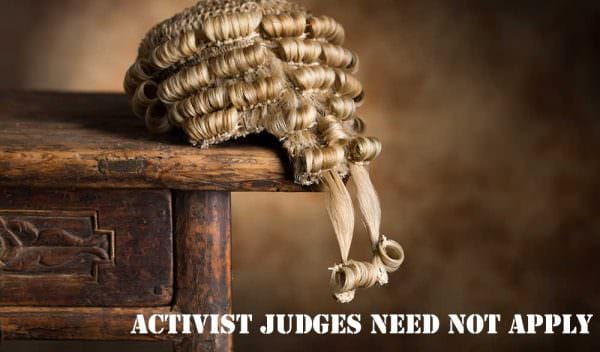By Roger J. Katz, Attorney at Law and Stephen L. D’Andrilli ~ Part 6


New York, NY -(Ammoland.com)- It is not the President who has intruded upon the domain of the Judiciary in violation of the Doctrine of Separation of Powers, but rather, it is the Judiciary, here, that has by all accounts, improperly intruded upon the domain of the executive and, in so doing, has undermined the separation of powers doctrine and has made difficult the President’s duty to faithfully execute the laws of this nation, and, has, as well, jeopardized the security of this nation and the safety and well-being of its citizens.
In a seminal case, decided well over two hundred years ago, Marbury vs. Madison, 5 U.S. 137, 1 CRANCH 137 (1803)—a case that all first year law students of accredited law schools study in depth, the Chief Justice of the United States Supreme Court made clear the role of the Judiciary in our THREE BRANCH SYSTEM OF GOVERNMENT. The Chief Justice, John Marshall, made clear the defining role of the Judiciary.
He said, “It is emphatically the province and duty of the judicial department to say what the law is. Those who apply the rule to particular cases, must of necessity expound and interpret that rule. If two laws conflict with each other, the courts must decide on the operation of each.”
Thus, the Chief Justice made clear that while Congress shall make the laws of this Nation, and the President shall faithfully execute the laws of this Nation, it is the role of the Judiciary—and the role of the Judiciary alone—that shall determine what the law is. That specific role clearly demarcates a singular prerogative of the Judiciary if any doubt had previously existed as to the specific singular prerogative of the Judiciary.
But, Marbury vs. Madison does not stand merely for the proposition that, in so asserting a specific defined role for the Judiciary upon which neither the President nor Congress may lawfully tread, there are not also areas in which the Judiciary, for its part, must not tread. Clearly, when laying out the scope of judicial inquiry Chief Justice Marshall was also circumspect in laying out the limits of Judicial inquiry—the parameters beyond which the Judiciary must not tread.
The Chief Justice stated, “Questions, in their nature political, or which are, by the constitution and laws, submitted to the executive, can never be made in this court.” Expounding further, the Chief Justice stated, “By the constitution of the United States, the President is invested with certain important political powers, in the exercise of which he is to use his own discretion, and is accountable only to his country in his political character, and to his own conscience. To aid him in the performance of these duties, he is authorized to appoint certain officers, who act by his authority and in conformity with his orders. In such cases, their acts are his acts; and whatever opinion may be entertained of the manner in which executive discretion may be used, still there exists, and can exist, no power to control that discretion. The subjects are political. They respect the nation, not individual rights, and being entrusted to the executive, the decision of the executive is conclusive. The application of this remark will be perceived by adverting to the act of congress for establishing the department of foreign affairs. This office, as his duties were prescribed by that act, is to conform precisely to the will of the President. He is the mere organ by whom that will is communicated. The acts of such an officer, as an officer, can never be examinable by the courts.”
It is a curious matter today that the Press, which isn’t a Branch of Government at all, often operates as if it is one, explaining as the voice of conscience—which it has little of—and the voice of reason—which has none of—how it is that, in its opinion, the U.S. President has overstepped his bounds of legal authority. The Press can, perhaps, be excused its excesses. It has long since lost credibility. But, the Ninth Circuit, for its part, should know better. It would have done well to read Marbury vs. Madison before rendering its decision in the latest case on the U.S. President’s temporary travel ban. Had the Ninth Circuit done so, it would have realized that it had transgressed the bounds of propriety by telling the President what his duty is, rather than more ably considering what its own duty is. Had the Ninth Circuit given more thought of the limits of judicial inquiry, it would have refrained from engaging in political matters where it has no business going, having no cognition of the dangers this Country faces from the outside—to which the U.S. President is particularly able to deal with and is charged to deal with—and unmindful of the dangers to the Constitution itself creates, on the inside, having failed to heed to its rightful purpose—namely, interpreting the laws of this Nation, and not telling the President what his job is and how he is expected to do that job and what he is expected to refrain from doing.
The issuance of a TRO by the U.S. District Court of the Western District of Washington, in the absence of any demonstrative legal basis to do so, is an example of a Court improperly intruding on the legitimate authority of the Executive to faithfully execute the laws of the Land.

The Ninth Circuit would have done well to remind the U.S. District Court not to intrude on Presidential prerogative. Instead, the Ninth Circuit makes matters worse by affirming the lower Court’s decision. The decision isn’t just wrongheaded from a legal standpoint, having misinterpreted the law. It is wrongheaded in another sense entirely. For the Ninth Circuit has taken a political matter—one wholly outside the purview of the Courts—and has turned it into a legal one, thereby improperly intruding on a domain completely outside Judicial review and outside Judicial prerogative. The President is right.
The President’s Executive Order, faithfully executing the laws of Congress is unreviewable. The Ninth Circuit, in defiance, of the clear separation of powers, decided to review the Executive Order anyway. Moreover, the Ninth Circuit takes into account matters wholly outside the allegations of the Complaint, relying, in great part, on biased newspaper accounts and editorials to support the District Court’s issuance of a TRO. The Ninth Circuit also improperly considers remarks the President made in his campaign—essentially nothing more than rhetoric. But, the Ninth Circuit then uses those remarks against the President, arguing that the Executive Order follows from religious bias toward Muslims. That is patently ridiculous.
The purport of the President’s Executive Order, on its face, is designed to protect this Country and its citizenry from the very problem facing the EU as a result of having taken in waves of refugees from the Middle East—many of whom have engaged in acts of terrorism across Europe. The President has taken a proactive stance, rather than a reactive stance, to protect American citizens from physical harm. The Ninth Circuit gives that matter no thought.
The mainstream media, for its part, shows its abject ignorance of our laws and jurisprudence, and ignorance of the separation of powers doctrine by asserting bombastically that President Trump’s Executive Order is unconstitutional and that the President, rather than the Judiciary, has ignominiously encroached on the powers of the Judiciary by referring to the U.S. District Judge for the Western District of Washington as a “so-called Judge.” The admonition on the part of the President hardly constitutes encroachment on the Separation of Powers. Improper issuance of a TRO, made all the worse through affirmance of the District Court’s Order by the United States Court of Appeals for the Ninth Circuit, however, does.
Hopefully, Judge Gorsuch will soon be confirmed by the U.S. Senate, and the U.S. Supreme Court will put matters right. For this Country teeters on the brink of anarchy wrought by those who would insinuate odd notions of morality into the framework of our Constitution and thrust into the public’s psyche alien ideas, devoid of reasoned, sensible reflection.
About The Arbalest Quarrel:
Arbalest Group created `The Arbalest Quarrel’ website for a special purpose. That purpose is to educate the American public about recent Federal and State firearms control legislation. No other website, to our knowledge, provides as deep an analysis or as thorough an analysis. Arbalest Group offers this information free.
For more information, visit: www.arbalestquarrel.com.

It’s really called misguided political activism by a run away and corrupt judiciary. It is past time for congress to consider articles of impeachment for these liberal and bombastic judges.
It was a unanimous decision with one of the judges (Richard Clifton) being nominated to the 9th Circuit by George W. Bush…
In other words, separation of powers is a bad thing.
@Gil Each of the branches is going beyond it authorized powers anyway. For instance, the Congress creates the BATFE, and gives the BATFE rule making authority. Those rules have the force and authority of law. The BATFE is administered by the Executive branch. The executive (the president) tells the BATFE to make some rule. The BATFE makes the rule that has the force and effect of law. Qoud Est Demonstratum: Congress has given away its legislative authority in contravention of the Constitution. The President gets to make rules. And now the Supreme Court, the S. Ct has never been given… Read more »
It’s called checks and balances.